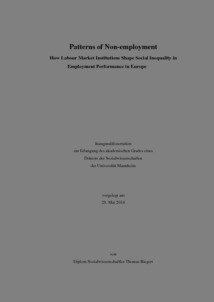|
Patterns of non-employment: How labour market institutions shape social inequality in employment performance in Europe
Biegert, Thomas
![[img]](https://madoc.bib.uni-mannheim.de/37391/1.hassmallThumbnailVersion/Dissertation.pdf)  Vorschau |
|
PDF
Dissertation.pdf
- Veröffentlichte Version
Download (1MB)
|
|
URL:
|
https://madoc.bib.uni-mannheim.de/37391
|
|
URN:
|
urn:nbn:de:bsz:180-madoc-373910
|
|
Dokumenttyp:
|
Dissertation
|
|
Erscheinungsjahr:
|
2014
|
|
Ort der Veröffentlichung:
|
Mannheim
|
|
Hochschule:
|
Universität Mannheim
|
|
Gutachter:
|
Ebbinghaus, Bernhard
|
|
Datum der mündl. Prüfung:
|
16 September 2014
|
|
Sprache der Veröffentlichung:
|
Englisch
|
|
Einrichtung:
|
Außerfakultäre Einrichtungen > MZES - Arbeitsbereich A
Außerfakultäre Einrichtungen > GESS - CDSS (SOWI)
Fakultät für Sozialwissenschaften > Soziologie III, Makrosoziologie (Ebbinghaus 2004-2016)
|
|
Fachgebiet:
|
300 Sozialwissenschaften, Soziologie, Anthropologie
|
|
Normierte Schlagwörter (SWD):
|
Arbeitsmarkt , Soziale Ungleichheit , Wohlfahrtsstaat
|
|
Freie Schlagwörter (Englisch):
|
labour market , social inequality , welfare state
|
|
Abstract:
|
The central research question of this dissertation is how labor market institutions shape social patterns of employment. More specifically, it analyzes how labour market policies and regulation affect the labour market performance of men and women, different age groups, and educational levels. Before conducting three empirical studies, a framework paper elaborates on why a focus on unemployment is not sufficient when interested in the distribution of employment and the disadvantaged positions of women, youth, older workers and those with low education. I argue that periods of inactivity need to be included and thus non-employment as a whole has to be subject of labour market analysis. Furthermore, the framework develops a macro-micro model of institutional impact on individual employment. It contrasts theoretical expectations of liberal economics with approaches that emphasize the importance of current labour market positions for subsequent careers and longitudinal search and matching processes. The three empirical studies proceed in two steps. First, study 1 quantifies the relationship between institutions and the social composition of non-employment in a multi-country analysis. The analysis establishes that institutional arrangements’ impact is heterogeneous. In general, social risk groups are affected more strongly, both negatively, by employment protection, powerful unions, unemployment insurance and labour taxes, and positively, by active labour market polices, centralized wage bargaining and social assistance. Second, taking a life-course perspective, studies 2 and 3 explore transitions and trajectories out of non-employment in the United Kingdom and Germany. The more strongly regulated German labour market leads to slower transitions back into work and – surprisingly – less stable long-term re-entry compared to the United Kingdom. German transitions and subsequent trajectories also exhibit an increased social inequality. Results from the three studies underline that institutional arrangements, which provide insiders with advantages, increase social inequality, lower overall employment and chances to return to work. Institutional arrangements that regulate the labour market in an indiscriminate way are associated with better social inclusion and higher employment.
|
 | Dieser Eintrag ist Teil der Universitätsbibliographie. |
 | Das Dokument wird vom Publikationsserver der Universitätsbibliothek Mannheim bereitgestellt. |
 Suche Autoren in Suche Autoren in
Sie haben einen Fehler gefunden? Teilen Sie uns Ihren Korrekturwunsch bitte hier mit: E-Mail
Actions (login required)
 |
Eintrag anzeigen |
|
|
